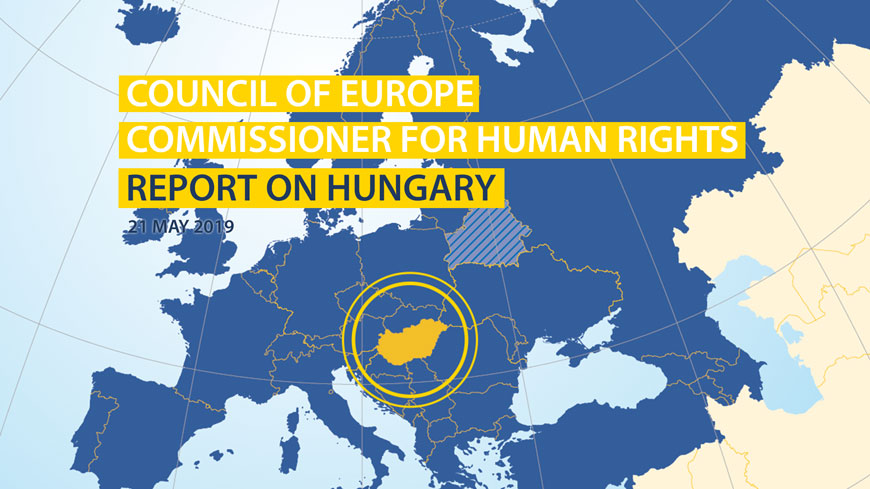“Human rights violations in Hungary have a negative effect on the whole protection system and the rule of law. They must be addressed as a matter of urgency,” says Council of Europe Commissioner for Human Rights, Dunja Mijatović, in a report published today on her visit to Hungary in February 2019. The report focuses on the human rights of asylum seekers and refugees; human rights defenders and civil society, independence of the judiciary; and gender equality and women’s rights.
The Commissioner finds that the government’s stance against immigration and asylum seekers has resulted in a legislative framework which undermines the reception of asylum seekers and the integration of recognised refugees. The Commissioner calls on the government to repeal the decreed “crisis situation due to mass immigration” which is not justified by the number of asylum seekers currently entering Hungary and the EU and urges the authorities to refrain from using anti-migrant rhetoric and campaigns which fan xenophobic attitudes.
The Commissioner observes that asylum seekers are constrained to exercise their right to apply for international protection in two transit zones along the fenced Hungarian-Serbian border where very few persons are allowed to enter. She urges the government to extend access to the international protection procedure and to ensure that the protection needs of all asylum seekers present on the territory can be assessed. “The government should repeal the new inadmissibility ground for asylum which has resulted in practically systematic rejection of asylum applications. I am also deeply concerned about repeated reports of excessive use of violence by the police during forcible removals of foreign nationals.”
The Commissioner considers that the systematic detention of asylum seekers, including children, in the transit zones without adequate legal basis raises issues about the arbitrary nature of the detention. “The authorities should apply alternatives to detention. I am also alarmed that many asylum seekers detained in the transit zones under an alien policing procedure have been deprived of food. This practice should stop immediately.”
The Commissioner points out that the recent legislative measures imposing restrictions on civil society space have stigmatised and criminalised NGO activities which are fully legitimate in a democratic society. “The measures exercise a continuous chilling effect on NGOs. Some of the legal provisions are exceptionally vague, arbitrary and not implemented in practice. Yet the sanctions have the potential to incur devastating consequences for the work of human rights defenders and NGOs. The harmful legislation should be repealed.”
The Commissioner observes that civil society organisations have been subject to intimidation, stigmatisation and smear campaigns. Human rights NGOs are rarely consulted by the authorities or granted government funding. The Commissioner urges the government to reverse its alarming course in relation to human rights defenders and NGOs and to create an enabling environment conducive to their work in line with human rights standards.
The Commissioner notes that a series of reforms of the judiciary in Hungary during the 2010s have drawn concern about their effects on the independence of the judiciary. She stresses that it is essential for the rule of law that the checks and balances established for the exercise of the broad powers of the President of the National Judicial Office be fully observed in the ordinary court system.
With reference to the future system of administrative courts, the Commissioner remains concerned about the pivotal role of the Minister of Justice in establishing and running it. “While the recent amendments made to the original legislation on administrative courts in response to the Opinion of the Venice Commission are welcome, they are not sufficient in addressing the serious concerns identified by the Commission. The extensive powers of the Minister should be counterbalanced by strengthening judicial self-governance.”
The Commissioner finds that Hungary is backsliding in gender equality. “The political representation of women is strikingly low and women’s issues are closely associated with family affairs in government policy. Although the government seeks to empower women through labour market participation, the focus of the newly adopted family protection action plan lies on women as child bearers. This carries the risk of reinforcing gender stereotypes and instrumentalising women.”
The Commissioner welcomes the government’s intention to prepare a new national strategy on gender equality. She stresses that it should be prepared in close consultation with all stakeholders. “The authorities should address the unequal representation of women in public life through positive measures and take determined action to eradicate gender stereotypes in educational materials.”
The Commissioner urges the authorities to ratify the Istanbul Convention on preventing and combating violence against women. She welcomes the authorities’ efforts to expand support services for victims of violence but points out that women’s access to justice is compromised by low levels of reporting and the lack of understanding by many judges and police officers of the realities of gender-based violence. “Training about violence against women should be strengthened among the judiciary, prosecutors and the police. There is also a need for broader awareness raising among the public.”



